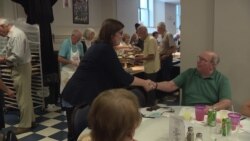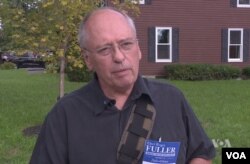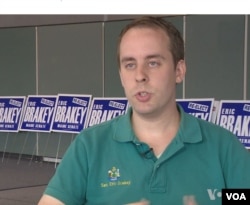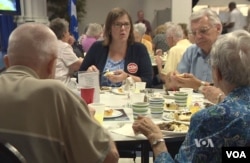It’s a hot day in late summer on a back road in Lewiston, Maine, and first-time candidate Roger Fuller can’t be happier. Armed with his bag of campaign leaflets and a big black Sharpie pen for signing personal messages, Fuller is well on his way to his goal of knocking on the door of every one of the 8,000 houses in his district at least three times.
Fuller’s aim to talk with all of his potential constituents before Election Day is a time-honored political tradition and a reminder that while Donald Trump and Hillary Clinton pack thousands into campaign rallies, candidates in small communities across America have to find personal ways to reach out to voters.
Small-town Maine is a long way from the high-stakes political world of Washington, D.C., but the real work of candidates connecting with voters happens in neighborhoods during county fairs and at all of the hundreds of little events in between that make up the life of a community.
Fuller has had doors slammed in his face and as he winds his way through the neighborhoods, there’s often no answer when he knocks.
"There can be long spaces between some of the homes," he says. "But still – going to every home, meeting people, seeing how they live, listening to them, it’s worth every step."
After 42 years as a teacher, Fuller says it was time to give back to the city that has been so good to him. He doesn’t look for houses with any known party identity or affiliation, saying that he wants to talk to all residents about the issues this election season. But he ultimately understands that those discussions may not be as important as the face-to-face contact.
"Politics is personal," he says, repeating an idea that guides every candidate here this election season. "If they know the person, they’re more likely to vote for the person."
Making an impression dripping wet
For Eric Brakey, the youngest state senator in the entire country, the hard work of campaigning is crucially important. Despite his age, he represents a county of mostly older voters. He says the ability to connect with them on a personal level allowed him to overcome the age barrier.
"Look at it on paper," he says, from the storefront office of the Maine Republican Party in downtown Lewiston. "Twenty-five-year old kid. No one has ever heard of him before, he’s never been a candidate before, he’s never held elected office before – what chance does he have to win a campaign against an incumbent state senator who is very well known?"
The answer, he says, was to knock on doors to dig deep into the issues in his district: the desire for welfare reform and a strong belief in Second Amendment gun rights.
"Once you talk to people, once you are able to discuss some of the issues that they really care about and propose real solutions, I think that really worked to my advantage."
Brakey heads out from the Republican Party offices to travel the back roads of Poland, Maine, planting his blue and white re-election signs on lawns. Just last week, he put out a call to neighbors to volunteer putting together signs and mail campaign literature. So many people answered the call he was able to finish the job in half the time – and now his signs have sprouted everywhere in this small town.
Brakey keeps a good sense of humor about the less serious side of politics. He recently took a turn in the dunk tank at the county fair to support a charity, saying that even soaking wet, "It’s always an opportunity for people to see you and say, ‘Oh! It’s Senator Brakey – oh, I had an issue. I wanted to call.’"
Marching in the Potato Blossom Festival
Emily Cain hasn’t forgotten her days campaigning for the Maine state legislature. Like Brakey, Cain went through the ritual of knocking on doors in her district. Now that she is running in one of the most hotly contested U.S. congressional districts this election season, she says, "I’m trying to take that to a bigger scale."
Today, that means her monthly lunch date at the Franco-American Center in the economically challenged former mill town of Lewiston. The room is filled with members of the aging French-speaking community that has held an important place in Maine history for centuries. But scattered throughout the room are new Somali immigrants who are helping keep that linguistic tradition alive. It’s the perfect mix of old and new in a congressional district that spans 11 counties and more than 27,000 square miles.
"I come to this lunch so that I can hear people’s stories," says Cain, as she moves among the tables, hugging and talking, careful not to interrupt the meals of chipped beef, mashed potatoes and sheet cake.
"One of the best parts of American politics is really getting to know someone personally, getting to know their story and where they come from. So these events are not much about me talking at all," she says.
Cain reels off just a few of the places she has been able to connect with voters: milking cows at a farm, drinking a beer at a racetrack, marching in the Potato Blossom Festival parade and handing out prizes at the Whoopie Pie Eating Contest. She’s had voters tell her directly they didn’t vote her into the state legislature but would vote her into Congress because they had finally had a chance to meet with her and now trusted her.
These events "are about me listening, answering people’s questions and really trying to get at what they care about," Cain says, "so that when I get to Congress, I’m able to tell their story about what really matters right here in Maine."
In these small communities, it is actually possible to meet every single voter and transfer personal moments into campaigning – and these small interactions add up to votes on Election Day.










